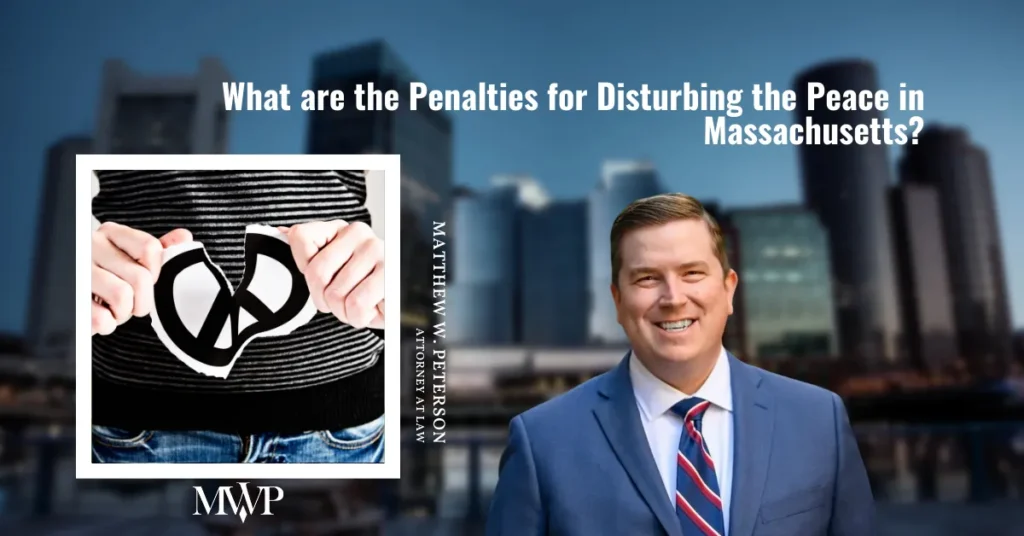Definition and Penalties For Disturbing of The Peace
A “disturbing of the peace” or “disorderly person” is punishable with a fine on the first offense. However, for a second offense, you can face up to six months in jail. The Law Office of Matthew Peterson is here to clarify what kind of penalties are for disturbing the peace.
Elements of the Offense
To prove an offense of disorderly conduct, the Commonwealth must establish that you either:
- Engaged in fighting or threatening behavior
- Engaged in violent or tumultuous behavior
- Created a hazardous or physically offensive condition through an act that served no legitimate purpose
Impact on the Public
This conduct must be “reasonably likely to affect the general public.” The Commonwealth must also demonstrate that you intended to cause “public inconvenience, annoyance, or alarm,” or that you acted recklessly in doing so.
Public Access Requirement
The conduct must affect the public, meaning it occurs in a place where the public (or a substantial group) has access.
Challenges in Proving Disorderly Conduct
Disorderly conduct is difficult to prove when it involves only words, as speech is protected by the First Amendment. To be guilty of disorderly conduct based solely on verbal expression, what was said must be particularly egregious—often referred to as “fighting words”—which goes beyond mere impolite or curse words.
Importance of Legal Representation
If you’ve been charged with disorderly conduct or a similar offense, it’s critical to contact a criminal defense attorney in Boston MA as soon as possible to begin your defense.
Contact The Law Office of Matthew Peterson
Our office is located in Boston, Massachusetts, but the Law Office of Matthew Peterson handles criminal cases, including disturbing the peace, in all Massachusetts courts. Contact us today at (617) 295-7500 so we can get started on your defense.
Frequently Asked Questions (FAQs) About Disorderly Conduct in Massachusetts
1. What are some examples of disorderly conduct?
Disorderly conduct can include a range of behaviors such as fighting in public, making threats, using offensive language that incites violence, or engaging in disruptive actions that interfere with public peace. Specific examples might include bar fights, shouting obscenities in a crowded area, or vandalizing property in a public space.
2. Can I be charged with disorderly conduct for simply expressing my opinion?
While the First Amendment protects free speech, you can be charged with disorderly conduct if your words are deemed “fighting words” or if they incite immediate violence or disruption. Context matters significantly; expressing an opinion in a calm and respectful manner is generally protected.
3. What defenses can be used against a disorderly conduct charge?
Common defenses against a disorderly conduct charge may include demonstrating that the behavior did not meet the legal definition of disorderly conduct, proving that the actions were justified under the circumstances (such as self-defense), or arguing that the prosecution cannot prove intent to cause public inconvenience or alarm.
4. Will a disorderly conduct charge result in a criminal record?
Yes, a conviction for disorderly conduct can result in a criminal record, which may have implications for future employment, housing, and other areas of life. However, first-time offenders may have options for diversion programs or expungement depending on the circumstances.
5. What should I do if I am arrested for disorderly conduct?
If you are arrested for disorderly conduct, it is crucial to remain calm and avoid further confrontation with law enforcement. You should exercise your right to remain silent and request an attorney immediately. Having legal representation can help protect your rights and build a strong defense against the charges.











